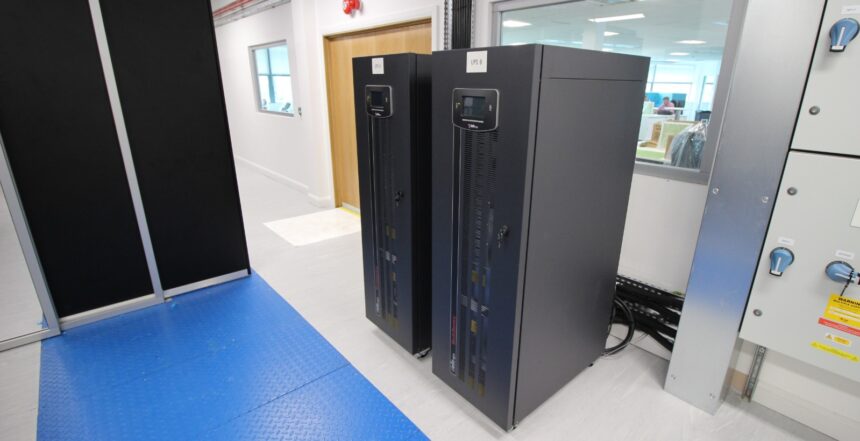When it comes to safeguarding critical data and ensuring uninterrupted operations, an uninterruptible power supply for servers is not just a luxury but an absolute necessity. Imagine this: your server room is humming along, hosting data for your growing enterprise, and then—bam!—a sudden blackout plunges it into silence. Without a reliable UPS (uninterruptible power supply), this moment could spell disaster for your business.
What Is an Uninterruptible Power Supply (UPS) for Servers?
Let’s start with the basics. A UPS is a device that provides backup power to servers during outages, ensuring that they continue to operate—or at least shut down properly—when electricity fails. Think of it as a vigilant night watchman standing guard over your digital assets.
In Singapore, where data centres are the backbone of industries ranging from finance to e-commerce, the importance of a robust UPS cannot be overstated. According to the Energy Market Authority, Singapore experienced 11 power interruptions in 2022, emphasising the need for reliable power solutions.
How Does a UPS Work?
The beauty of a UPS lies in its simplicity and efficiency.
1. Battery Backup:
When the main power supply cuts off, the UPS instantly switches to its built-in battery, ensuring no downtime.
2. Voltage Regulation:
UPS systems also act as a buffer against power surges, protecting sensitive server equipment.
3. Time to Act:
Most UPS systems provide sufficient time—ranging from minutes to hours—to either restore power or safely shut down servers.
This seamless transition from mains power to battery ensures that your data and hardware remain unharmed.
Types of UPS Systems
Not all UPS systems are created equal. Depending on your business needs, you may choose from the following:
- Standby UPS: Best for small businesses or home offices. It kicks in only during power interruptions.
- Line-Interactive UPS: Perfect for environments with frequent voltage fluctuations.
- Online UPS: The crème de la crème, designed for businesses with critical servers. It continuously powers devices through its inverter, ensuring zero transfer time.
Why Is a UPS Essential for Servers?
In a digital-first world, your servers are the lifeblood of your operations. A power outage can lead to:
- Data Loss: Sudden shutdowns often result in corrupted or lost files.
- Hardware Damage: Power surges can fry sensitive server components.
- Downtime Costs: A single hour of server downtime can cost businesses in Singapore upwards of S$100,000, depending on the industry.
A UPS acts as a protective shield, ensuring that these risks are mitigated.
Key Features to Look for in a UPS
Choosing the right UPS for your servers is not just about picking a brand; it’s about selecting features that meet your specific needs:
- Power Capacity: Measured in VA (Volt-Amps), ensure your UPS can handle the load of all connected devices.
- Battery Runtime: Choose a UPS with sufficient backup time to bridge power gaps or allow for a controlled shutdown.
- Scalability: As your business grows, your UPS should be able to support additional devices.
- Network Monitoring: Many modern UPS systems come with software for real-time monitoring and alerts.
- Maintenance Bypass Switch: Allows servicing without shutting down connected equipment.
The Singapore Context: Why a UPS Matters Locally
Singapore, as a global hub for data centres, is home to over 70 data centres, with more under construction. These facilities collectively consume 7% of the nation’s total electricity, according to a report by the Infocomm Media Development Authority (IMDA).
Power interruptions, while rare, can have devastating effects in such a high-stakes environment. For small businesses, the stakes are equally high; a single lost transaction can cascade into customer dissatisfaction and revenue loss.
The Environmental Angle
Interestingly, UPS systems are not just about protection—they can also contribute to sustainability.
- Energy Efficiency: Many modern UPS systems are designed to minimise energy waste.
- Recycling Initiatives: Look for manufacturers that offer battery recycling programs.
- Renewable Integration: Some UPS systems are compatible with solar power setups, reducing reliance on grid electricity.
Maintenance Tips for Longevity
Like any critical equipment, a UPS needs regular care to perform at its best.
- Quarterly Battery Checks: Ensure batteries are fully charged and free of corrosion.
- Firmware Updates: Keep the UPS software up to date for optimal performance.
- Annual Load Testing: Simulate a power outage to test the UPS’s response.
- Proactive Replacement: Batteries typically last 3–5 years; replace them before failure.
Investing a little time in maintenance can save you a fortune in unexpected repairs and downtime.
The Business Case for a UPS
If you’re still on the fence about investing in a UPS, consider this:
- ROI in Productivity: For every dollar spent on a UPS, businesses can save S$10 in downtime costs, based on estimates from Singapore’s tech consultancy firms.
- Customer Trust: Reliable operations mean fewer disruptions, enhancing customer confidence.
- Regulatory Compliance: Many industries, such as finance and healthcare, mandate continuous server uptime.
In other words, a UPS isn’t just an expense—it’s a smart investment in your business’s future.
Conclusion
In today’s always-on digital landscape, power interruptions are more than an inconvenience; they are a threat to business continuity. A reliable uninterruptible power supply for servers ensures that your operations run smoothly, your data remains safe, and your hardware stays protected. Whether you’re running a small business or managing a sprawling data centre, investing in a UPS is a decision that pays for itself in both peace of mind and measurable savings.
When considering your next purchase, remember that the cost of not having an uninterruptible power supply for servers is far greater than the investment itself.







